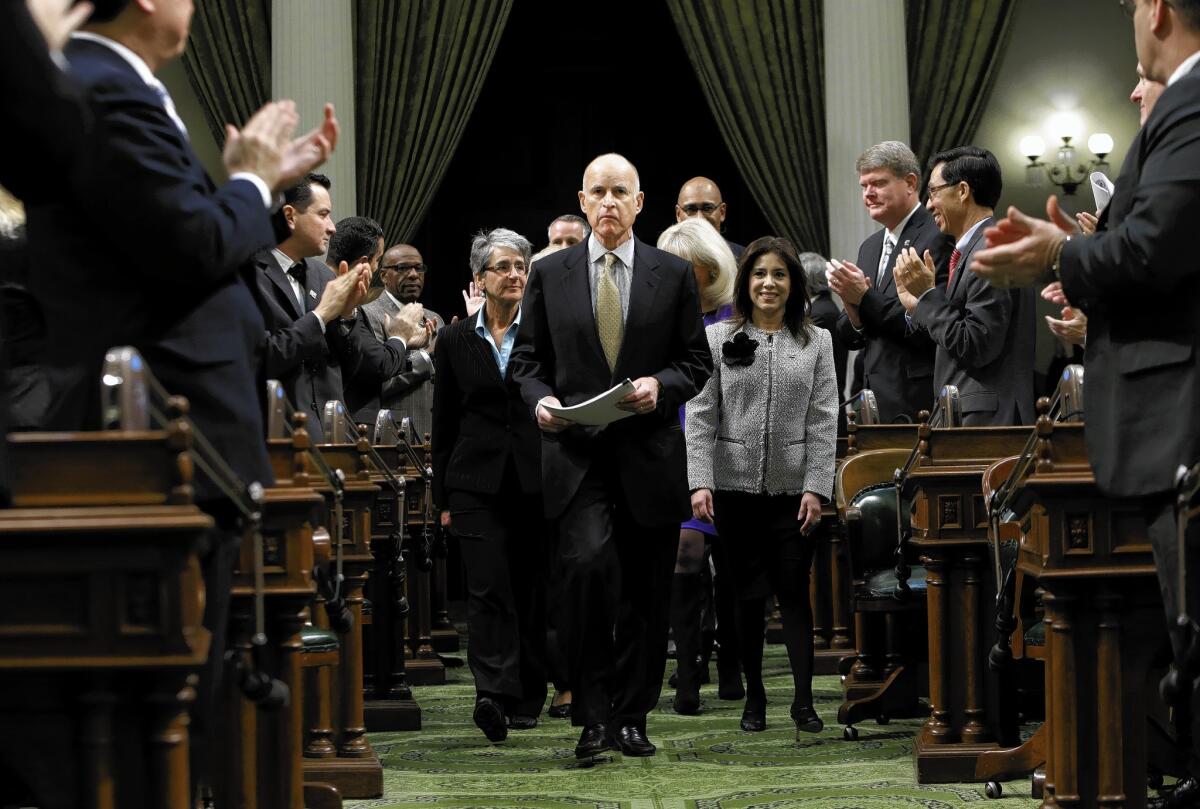California lawmakers face water, prison and budget issues in 2014

- Share via
SACRAMENTO — Returning to the Capitol on Monday after a four-month recess, state lawmakers are set to tackle water issues, prison overcrowding and a budget debate that will be shaped largely by the state’s rosier economic outlook.
Other factors will also affect legislative decisions in 2014: election-year politics, internal leadership battles and a continuing federal corruption investigation into allegations that Sen. Ronald S. Calderon (D-Montebello) accepted bribes to exercise influence on bills.
Officials have predicted a $2.2-billion surplus when the current fiscal year ends in June. The state’s improved financial footing could set off new battles over whether to restore social services slashed during the recession or hold off on any significantly higher spending.
Early budget proposals from legislative leaders have attempted to strike a balance. Gov. Jerry Brown will release his budget plan Friday.
“Even with the improved revenue, there is a lot of work to do to keep California’s fiscal house in order,” said Assembly Speaker John A. Pérez (D-Los Angeles). He laid out dual priorities of “maintaining stability and expanding opportunity.”
Pérez, who is running for state controller, unveiled some budget proposals last month that include putting $2 billion into a rainy day fund. He did not specify a price tag for his ideas, which include higher Medi-Cal reimbursements for health providers and more tax credits for low-income families.
Senate President Pro Tem Darrell Steinberg (D-Sacramento) said in an interview he wants to use a third of any surplus for a rainy day fund, a third to pay down debt and the rest to replenish social service programs cut in recent years, among other purposes.
Both leaders urge that pre-kindergarten programs be made available to all 4-year-olds in California. Currently, a quarter of 4-year-olds are eligible for transitional kindergarten funded by the state.
The optimistic economic projections by the state Legislative Analyst’s Office had made some Republicans wary of Democrats’ potential spending ambitions. But the Democratic leaders’ cautious words appeared to have allayed at least some concerns.
“The Legislature has a tendency to say, ‘Oh, money! Well, we’ve got to spend it,’” said Assembly Republican Leader Connie Conway (R-Tulare). “I’m encouraged when people say let’s look at the rainy day fund, not jump in and spend it all immediately.”
Lawmakers are also gearing up to renegotiate the size of an $11-billion water bond on the November ballot. The bond has been criticized as too large and stuffed with pork, and the Legislature has postponed a statewide vote on the measure several times.
The state is facing its third consecutive dry winter. Those conditions “create an environment where people see the necessity for a water bond,” said Assemblyman Anthony Rendon (D-Lakewood), who has chaired a working group on the issue.
His group put forth a reworked, $6.5-billion bond and has held hearings on it throughout the state. A separate Senate plan, by Sen. Lois Wolk (D-Davis), carries the same price.
Conway said she was concerned about significantly scaling back the water bond because some regional priorities — such as water storage projects in the Central Valley — could go by the wayside.
“It’s better to be inclusive,” Conway said. “That’s the biggest fear — that if you cut it back too much, someone is going to lose out.”
The state is still under pressure to ease prison crowding, and federal judges have given the Brown administration until Friday to negotiate a new long-term plan to address the prison population. So the Legislature is expected to spend significant time looking at the state’s criminal justice system.
Democrats want to ease sentencing laws and expand programs to keep parolees from re-offending.
“There is a great opportunity this year to change the criminal justice system in a more effective way and focus like a laser on the 65% revolving door recidivism rate that is the real cause of our perpetual overcrowding,” Steinberg said.
Republicans are calling for new prison construction. Senate GOP leader Robert Huff of Diamond Bar said he also wants a reexamination of the state’s decision a few years ago to have thousands of nonviolent felons serve time in county jails instead of prisons.
“We’re seeing a documented uptick in property crimes” because of the new custody rule, Huff said. “We may have to revisit how we are meeting the court mandate” to reduce crowding.
Both the Assembly and Senate face new leadership battles, with Pérez and Steinberg leaving their posts at the end of the year because of term limits.
Steinberg has said he wants to remain Senate leader until he departs. He has support from a leading contender to replace him, Sen. Kevin de León (D-Los Angeles).
Some Democrats say de León has all but sewn up the votes needed to become the first Southern Californian to lead the Senate since David Roberti of Van Nuys held the post 20 years ago. But de León has competition from Sen. Mark DeSaulnier (D-Concord), and Capitol watchers say other possible contenders include former Assembly Speaker Bob Hertzberg, a Democrat from Los Angeles who is running for the Senate this year.
Pérez has said he’d like to stay on as speaker until the summer, after the next budget is approved. No clear front-runner has emerged to succeed him.
ker Bob Hertzberg, a Democrat from Los Angeles who is running for the Senate this year.
Pérez has said he’d like to stay on as speaker until the summer, after the next budget is approved. No clear front-runner has emerged to succeed him.
More to Read
Sign up for Essential California
The most important California stories and recommendations in your inbox every morning.
You may occasionally receive promotional content from the Los Angeles Times.












